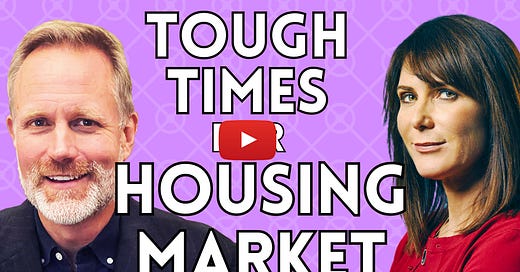Housing Market Is "Going To Be Tough Going Forward" | Ivy Zelman
Top real estate analyst expects a 'slow grind' downwards ahead for national home prices
The real estate market is a tangled mess right now.
High vacancies along with higher interest rates and tighter lending standards are wreaking carnage across much of the commercial sector these days.
However, higher mortgage rates have NOT brought down residential home prices, at least not on a national average...yet. That said, transactions have frozen up, falling to the lowest level in decades.
Where is all this headed?
Are things likely to get better, or worse, from here?
For answers, I was fortunate to speak with Ivy Zelman yesterday. Ivy is the Executive Vice President and Co-Founder of Zelman & Associates, one of the most respected research firms advising investors and corporate executives on the real estate market over the past 30 years.
Ivy is not very sanguine about the road ahead. For many reasons, she predicts “it’s going to be tough going forward” for the housing market.
To learn why, click here or on the video below:
I’m so grateful to everyone who has kindly supported me by becoming a premium subscriber to this Substack. It’s making an important difference in helping me afford the substantial startup costs of running Thoughtful Money.
Premium supporters receive my “Adam’s Notes” summaries to the interviews I do, the new MacroPass rotation of reports from esteemed experts, plus periodic advance-viewing/exclusive content. My Adam’s Notes for this discussion with Ivy are available to them below.
If you, too, would like to become a premium subscriber to this Substack (it’s only $15/mo, less than $0.50/day), then sign up now below:
Adam’s Notes: Ivy Zelman (recorded 8.12.24)
EXECUTIVE SUMMARY
The housing market is still grappling with affordability issues, even though there has been a slight improvement due to a recent dip in mortgage rates, with 30-year fixed rates dropping from over 7% to around 6.55%. However, despite this decline, overall affordability remains stretched, with existing home prices about 20% above historic trends and new home prices about 10% above trend. Builders are attempting to mitigate this through incentives like mortgage rate buy-downs, making new homes slightly more affordable compared to existing ones.
Nationally, housing inventory remains very low, contributing to the reduced number of transactions. However, some markets are beginning to see a rise in inventory levels, with around 23% of U.S. housing markets returning to 2019 or earlier levels of inventory. Certain areas, particularly in the "smile states" like Florida, are seeing significant increases in available homes, Tampa, for example, has seen inventory levels surge by over 90%. This rise in inventory could indicate potential price adjustments in these overbuilt or overheated markets.
Builders' Strategies: Homebuilders continue to push forward with new construction despite the challenging market. Over 50% of the new home market is controlled by public companies that are under pressure to deliver revenue growth, which drives them to continue building. Builders are using strategies like mortgage rate buy-downs to make homes more affordable and stimulate demand, even as they face rising costs, particularly for land, which continues to increase at about 10% per year. The push for new homes could lead to further pricing pressure, especially if these homes are slow to sell.
Homeowners are increasingly burdened by rising costs beyond just mortgage rates. Insurance and property taxes are climbing, particularly in regions like Florida where these expenses have spiked dramatically due to new codes and increased risks from natural disasters. These rising costs are making it difficult for some homeowners to maintain their properties, potentially leading to an increase in inventory as more people find homeownership too expensive to sustain.
The broader economic environment, including the potential for a slowing economy and an impending recession, is likely to exert additional pressure on the housing market. If a recession does occur, it could result in higher default rates and forced sales, particularly in speculative markets with significant investor activity. Historical parallels, such as the ‘90-91 recession, suggest that housing could see increased turnover due to defaults, even as prices remain pressured in markets with rising inventory.
Despite the challenging market conditions, investor sentiment remains strong, particularly in markets with abundant new construction. Investors, including both large institutions and "mom and pop" buyers, are still purchasing homes, viewing real estate as a diversification strategy amid uncertain economic conditions. However, if the market sentiment shifts, possibly due to an inability to rent out properties or falling prices, there could be a significant negative impact, particularly in markets like Tampa and Austin, where investor activity and new construction are high.
Ivy advises that
Keep reading with a 7-day free trial
Subscribe to Adam Taggart's Thoughtful Money® to keep reading this post and get 7 days of free access to the full post archives.




